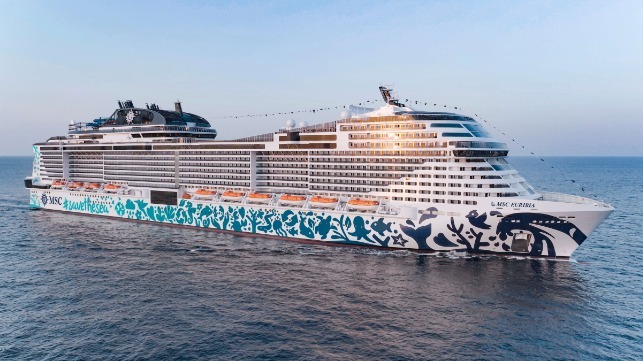Dutch Advertising Standards Reprimands MSC Cruises for Environmental Claims

Environmental groups are continuing their efforts to limit the claims of the shipping industry and specifically cruise ships for what they believe are aggressive statements about the impact and progress of the ships in the efforts to decarbonize. The Dutch authority which regulates statements in advertising agreed in part with a filing made by three groups against MSC Cruises ordering the cruise line to remove some assertions from its advertising.
The Reclame Code Commissie which administers the advertising code in the Netherlands agreed with the groups that some of the statements about the use of liquified natural gas and milestones in the effort to achieve net zero by 2050 were possibly misleading to consumers and needed to be removed. The ruling bars the company from “showing off plans that are not concrete,” according to Fossielvrij NL (Fossil Free Netherlands) one of the three groups that filed the complaint. In addition, the cruise line is limited from presenting its two LNG-fueled cruise ships which are currently in service as “an important milestone in this journey,” according to the group.
The decision however rejected other claims from the groups about cruising not being environmentally friendly. The groups had demanded in an April 2024 filing that all cruise advertising be stopped. They contended that cruising was one of the least environmentally friendly forms of vacationing.
The groups, Fossil Free along with Advocates for the Future and Reclamejagers (Advertising Hunters) were emboldened in their efforts after winning a similar decision earlier this year regarding the advertising statements made by the Dutch airline KLM. They allege that the companies are part of a broader effort at “greenwashing” (the practice of using misleading statements to promote better environmental performance).
The filing pointed to MSC’s promotion of the two LNG-fueled cruise ships as using one of the cleanest marine fuels. The groups argue that much of the LNG is derived from fracking in the United States which they contend releases methane and is environmentally unfriendly.
They also highlighted that MSC has 20 other cruise ships that continue to use traditional fuel oil. They argued in their filing that MSC says it is preparing to use bio- or synthetic LNG while those fuels are not yet available, or scalable, and that MSC would face competition for the limited supplies. The current methods to produce synthetic LNG they also allege are extremely energy intensive.
A spokesperson for MSC Cruises told Bloomberg that the company has already enacted most of the recommendations of the advertising standards board. The decision however could have wider ramifications for more segments of the shipping industry and other businesses in how they present their efforts.
MSC Cruises is investing in a broad range of efforts as it plans the transition of its cruise fleet. They were among the first cruise lines to introduce large LNG-fueled cruise ships with the MSC World Europa (215,800 GT) in December 2022 and the MSC Euribia (181,000 GT) in June 2023. The cruise line is building three additional LNG-fueled cruise ships for the World Class but is also participating in tests such as fuel cells. It is also planning for synthetic non-carbon fuels.
This is the latest in a series of efforts launched in recent months targeting cruise ships. The Dutch environmental group Extinction Rebellion blocked the entry of cruise ships into Amsterdam. The activist NGO Transport & Environment (T&E) also issued a report citing the growth of the industry along with the increased size of individual ships. They are calling for a tax on the cruise industry to help fund the transition to zero-carbon fuels and ensure the industry contributes its share to the ongoing efforts.
No comments:
Post a Comment